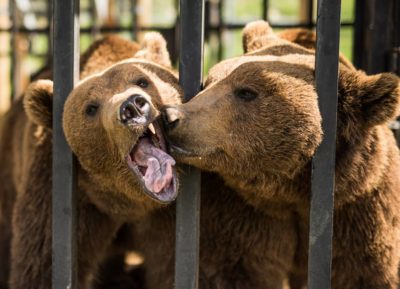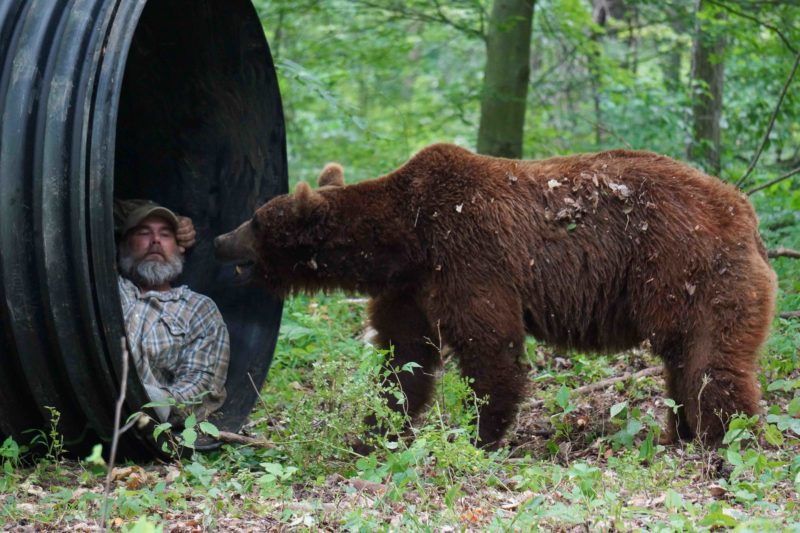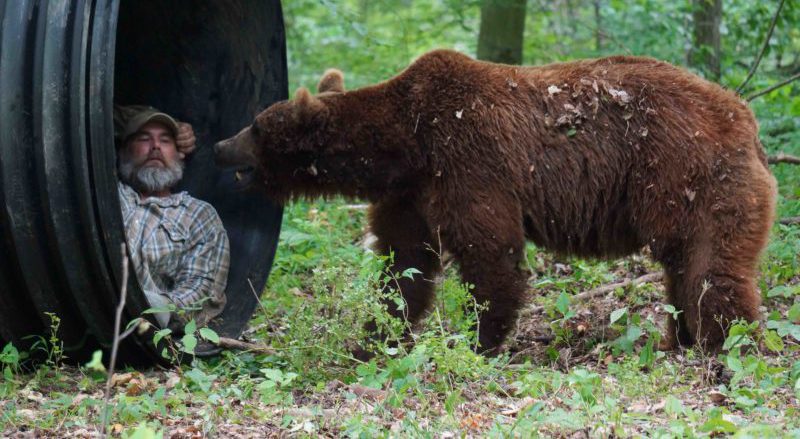INTERVIEW: Bear trainer tries to release grizzlies from captivity on new TV show

In Project Grizzly, the new reality series on Animal Planet, bear trainer Jeff Watson tries to accomplish a task that seems almost impossible. For more than 20 years, he has taken care of and bonded with two grizzly bears affectionately named Bob and Screech. However, he had a change of heart about the animals’ captivity and started a process of introducing the bruins to the wild. His adventures, including many setbacks, are the subject of the new series, which airs episodes Saturdays at 10 p.m.
Watson said he has wanted to attempt this challenge for a long time, and circumstances dictated that he try with Bob and Screech at this time in their life.
“These guys stay with their mothers two-and-a-half, three-and-a-half, sometimes four-and-a-half years, so the time was now if I was going to do it,” he said. “I was in a position financially where I could do it right now. Most handlers and trainers don’t want to take an animal they’ve invested a lot of time into, that they make a living from, and then turn it loose. … You’re not going to pay any light bills or any house payments if you do that, but I’m in a position where I could go ahead and do this. It was time. I wanted to see if it was possible. I’ve had bears that I’ve picked up that were out in the wild, taken to zoos. I was just the carrier, and I was contracted to haul them. I thought, well, maybe I can take bears and release them to the wild. And nobody’s done it with brown bears that are captive born, captive raised and of this age.”
Animal captivity is a controversial topic, and so is the practice of keeping exotic animals and turning a profit on their activities, such as animal acting. Project Grizzly is not about that side of the debate and more about the probability of success (or failure) for Bob and Screech’s future.
“They were born in captivity at a park in Georgia,” Watson said of the bears’ origin. “It was a bear park, a tourist little area. I got them when they were young there. That place is shut down. All of their animals went to different sanctuaries, but I got the babies when they were young. They were actually given to me because they would breed them. Sometimes they kept them; sometimes they wouldn’t. This is a year they didn’t want them, and I was able to get them.”

A grizzly bear is the name given to brown bears that live in the lower 48. They are distinct from black bears for a number of reasons, including the characteristic hump on the back of their neck and a grizzled look to their fur. They are enormous animals that have captured people’s attention for generations, and they continue to cause traffic jams of oohing-and-aahing tourists in Yellowstone and Glacier national parks.
To take these majestic creatures from captivity to a wild, free-range setting was a “difficult decision,” Watson said.
“It’s not always as pleasant and as safe for them as it would be in captivity,” he said. “They’re protected from hunters. They have medical and dental, so life isn’t always worse in captivity. For some animals, they don’t handle captivity very well, some individual animals. It’s natural, and that’s the thing. I wanted to see how they responded to it, if it made their lives better. I don’t know if I’ll ever know that. They can’t talk.”
When Watson took Bob and Screech to the woods to work on their introduction, he had no idea what was going to happen. He wanted to learn what was innate and instinctive in the creatures.
“I expected obstacles most definitely,” he said. “I didn’t know if they would dig their own den. Obviously they’re not stupid animals. They’re highly intelligent, so they would try to protect themselves from weather. And if it’s snowing, they don’t want to be around the snow. … But would they den? Would they know to dig a den? Would they know how to catch fish? Because brown bears in the wild in North America normally catch fish that are salmon or trout, and they’re spawning. They’re swimming upstream. I can catch one doing that. Other times they’ll actually juggle them in a shallow area. I thought, is this something the mother has to teach them? Does she have to teach at an early age? Is it too late? So I’ve learned some things. Again, what I’ve learned, does it apply to only Bob and Screech? Can that be applicable to other bears? They are individuals, so I’m learning. But at the same time, there’s more questions that it’s raising.”
Ever since Watson was given Bob and Screech, he has kept them on a high-fat diet and eventually transitioned them to solids, such as dog food. Eventually they were fed yogurt, grapes, apples, carrots, salmon and trout.
“They’ll get their treats of macaroni and cheese and a little bit of fried chicken here and there,” he said. “Those are treats. These animals like human food. It’s palatable, and it has a lot of calories. And bears are always trying to get calories because that’s survival. This is an animal that can hibernate five to seven months out of the year, so when they are awake, they have to take on the fat.”
Watson’s most famous bear is Brody, a big Kodiak bruin that came from legendary animal trainer Lloyd Beebe, who worked on the Grizzly Adams movie and TV series. “Lloyd was very well known in the industry, a good man,” Watson said.
Watson did not “rescue” Brody, and the trainer said that term is thrown around too loosely nowadays. “Rescue has been thrown around a lot by different handlers of exotic and domesticated animals, wild animals, and it makes people feel good if you say it was rescued,” he said. “I think people have tapped into that, so, no, a lot of my bears have come from I think very good people, very good trainers, people who are very compassionate with their animals. They’re very concerned with the way they treat them.”
In Watson’s response, one can detect the controversy that surrounds animal training. There are many people who object to animals living in captivity and humans making money off those animals. These are debates that continue to change and affect the world of ambassador animals, animals for entertainment purposes, animal acting and certain zoo-like parks.
“It’s been a tough road because if you have an animal and generate 5 cents off it, there’s somebody out there who’s going to say, ‘Well, you’re exploiting the animal for monetary gain,'” Watson said. “That’s not always the case. Oftentimes that’s not the case. … My bears have made money, which fed them, fed my family, but I do hope that people who will go into this thinking, oh, he’s just using these animals in the past to make money, I hope they can understand that I love them. I hope what they take away is an interest in bears for themselves. The more that people are interested in these animals, the more that the animals benefit.”
Watson’s fascination with bears originates with the Grizzly Adams movie, which he saw in theaters in 1974. He was 9 years old at time of the screening and continued his love for the character with the late 1970s TV series starring Dan Haggerty. Then a neurological disease changed Watson’s life at the age of 20.
“I was paralyzed for a while,” he said. “Somebody had a bear cub, and I wanted it. It was my first bear in 1988. I got it. I just wanted to hang out in the woods with it. For whatever reason after having this illness, I just want to hang out with this animal. I realized right away it’s not a dog. People wanted to see it, and I thought how can I marriage a hobby with a profession. So I didn’t get into this industry, if you will, or in the handling of bears, to make money, to do any type of commercial work. It just started off I just wanted to hang out with a bear in the woods, and a lot of that was based on growing up watching Grizzly Adams.”
Now, according to an Animal Planet press release, he has gone through an epiphany.
“After making a life of rescuing and raising bears, Jeff Watson had an epiphany — bears do not belong in captivity,” the press release reads. “Jeff sets out to reverse the cycle of man’s ownership over animals starting with Bob and Screech. Saving them at just six weeks old, he raised them as his family and now believes after three years, their destiny is to live in the wild.”
By John Soltes / Publisher / John@HollywoodSoapbox.com
Project Grizzly airs new episodes Saturdays at 10 p.m. on Animal Planet. Click here for more information.


My prayers are with you. If you can achieve this, it could potentially save other bears. I love all animals bears included. I am a mother so I understand the bond that you have is hard to break. I also understand that you instinctively want to protect these bears. Sometimes kids need tough love. If it can save their lives then it’s worth it. We are rooting for you and I know that you are a good man with good intentions.
My husband and I are thoroughly enjoying this series; we are watching the final episode right now. You are a brave, caring, and loving “daddy”, we wish you much success in all future endeavors. God Bless!
Why not put the Bears in the sanctuary instead of out in the wild in Alaska or Canada?
Was disappionted the series wentoff the air because you hooked us, then, we never got to see if he ever got to release the bears? What is Jeff doing now?
You are an amazing, generous man. Your bears are lucky to have you in their lives. We can tell how much you all love each other, so setting them free with unsertanty has to be heart breaking. Will you bring Bob back to your sanctuary if he can’t feed himself property? I’m worried for him. God Bless
Love the show, love bears as well. I have had many interactions in the wild with bears, all Black Bears and really respect them all. Greatly appreciate what you have done for Bob and Screech as they would not have survived otherwise. Would love an update on them please. I would also consider supporting in the future. Thank you, Chuck
I enjoyed your program.I think Bob + Screech would do fine in the wild .We have the Northern lights refuge in northern BC. They let their black beat cubs go after about 2 years + the seem to adapt to the wild right away.I don,t see why your grizleys wouldn,t do likewise.All the best to you.
I have no doubt that Jeff loves his bears and takes care of them. However, this show has taken information about bears back to the stone age. The amount of misinformation is astounding. It upsets me that people watch this show and believe what Jeff says because he is the “Bear Man”. Example: Bear cubs stay with their mothers until 4 and a half years old. That is completely false. I have never heard of a cub staying past 3 years old. Mom kicks the cub out as soon as they can take care of themselves. In fact, bears typically reach sexually maturity at age 4.
Another big falsity is that he will release the bears into the wilds of Alaska. That is completely illegal. Alaska is very protective of their bears’ bloodlines. In fact, if an orphaned bear is rescued from Alaska, it is a requirement that that bear be fixed to make sure their bloodline doesn’t get bred into captivity.
i lost your email address after the birth of your grandbabies. how are they and how are the bears?
llost address over the years. would love to hear how grandbabies and Bob and
screech are
Please may l get an update. I thoroughly enjoyed the series and would love to hear if they were returned to the wild. They are beautiful animals and are very lucky to have someone like you who obviously loved and cared for them